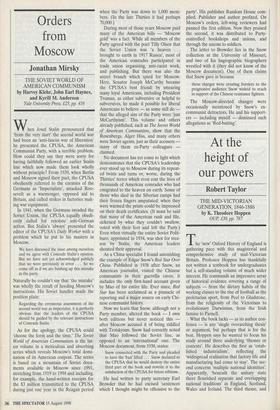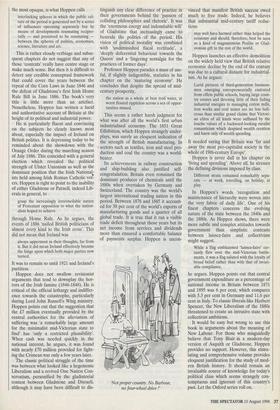At the height of our powers
Robert Taylor
THE MID-VICTORIAN GENERATION, 1846-1886 by K. Theodore Hoppen OUP, i3O, pp. 787 The 'new' Oxford History of England is gathering pace with this magisterial and comprehensive study of mid-Victorian Britain. Professor Hoppen has thankfully not written a textbook for undergraduates but a self-standing volume of much wider interest. He commands an impressive array of historical evidence covering a range of subjects — from the dietary habits of the working classes to the rise of football as the proletarian sport, from Peel to Gladstone, from the religiosity of the Victorians to evolutionary Darwinism, from the Irish famine to Parnell.
What the book lacks — as its author con- fesses — is any 'single overarching thesis' or argument, but perhaps that is for the best. Hoppen says he wanted to focus his study around three underlying 'themes or contexts'. He describes the first as 'estab- lished industrialism', reflecting the `widespread realisation that factory life and manufacturing had come to stay'. The sec- ond concerns 'multiple national identities'. Apparently, 'beneath the unitary state there flourished separate and overlapping national traditions' in England, Scotland, Wales and Ireland. The third theme, and the most opaque, is what Hoppen calls
interlocking spheres in which the public cul- ture of the period is generated not by a series of influences operating separately but by means of developments resonating recipro- cally — and perceived to be resonating between the spheres of politics, economics, science, literature and art.
This is rather cloudy verbiage and subse- quent chapters do not suggest that any of those `contexts' really have centre stage or make much sense. But then it is difficult to detect any credible conceptual framework that could cover the years between the repeal of the Corn Laws in June 1846 and the defeat of Gladstone's first Irish Home Rule Bill in June 1886. The book's very title is little more than an artefact. Nonetheless, Hoppen has written a lucid and authoritative account of Britain at the height of its political and industrial power.
He is particularly fluent and convincing on the subjects he clearly knows most about, especially the impact of Ireland on British politics. It is depressing today to be reminded about the showdown with the Orange Order during the marching season of July 1886. This coincided with a general election which revealed the political strength of Ulster Unionism as well as the dominant position that the Irish National.; ists held among Irish Roman Catholic vot- ers. Hoppen is right to point to the inability of either Gladstone or Parnell, indeed Lib- erals in general, to
grasp the increasingly irreconcilable nature of Protestant opposition to what the nation- alists hoped to achieve
through Home Rule. As he argues, the events of 1886 'nailed British politicians of almost every kind to the Irish cross'. This did not mean that Ireland was
always uppermost in their thoughts, far from it. But it did mean Ireland effectively became the hinge upon which both major parties now turned.
It was to remain so until 1921 and Ireland's partition.
Hoppen does not swallow revisionist arguments that tend to downplay the hor- rors of the Irish famine (1846-1848). He is critical of the official lethargy and indiffer- ence towards the catastrophe, particularly during Lord John Russell's Whig ministry. Hoppen points out that the suggestion that the £7 million eventually provided by the central authorities for the alleviation of suffering was 'a remarkably large amount for the minimalist mid-Victorian state to find' has 'only a restricted plausibility'. When cash was needed quickly in the national interest, he argues, it was found with nearly £70 million provided for fight- ing the Crimean war only a few years later.
The classic political struggle of the time was between what looked like a hegemonic Liberalism and a revived One Nation Con- servatism, personified by the gladiatorial contest between Gladstone and Disraeli, although it may have been difficult to dis- tinguish any clear difference of practice in their governments behind the 'passion of colliding philosophies and rhetoric'. It was the 'enormous energy and indomitable will' of Gladstone that increasingly came to bestride the politics of the period. His vision of political morality was combined with 'undiminished fiscal rectitude', a `deeply deferential behaviour towards the Queen' and a 'lingering nostalgia for the practices of former days'.
Professor Hoppen parades a mass of use- ful, if slightly indigestible, statistics in his chapter on the `maturing economy'. He concludes that despite the spread of mid- century prosperity,
the nation as a whole at best trod water, at worst floated rippleless across a sea of oppor- tunities missed.
This seems a rather harsh judgment for what was after all the world's first urban industrialised economy. The 1851 Great Ethibition, which Hoppen strangely under- plays, was surely an eloquent indication of the strength of British manufacturing. In sectors such as textiles, iron and steel pro- duction and coal the country was a world- beater.
Its achievements in railway construction and ship-building also justified self- congratulation. Britain even remained the dominant producer of chemicals until the 1880s when overtaken by Germany and Switzerland. The country was the world's largest international trading nation in this period. Between 1876 and 1885 it account- ed for 38 per cent of the world's exports of manufacturing goods and a quarter of all global trade. It is true that it ran a visible trade deficit throughout those years but its net income from services and dividends more than ensured a comfortable balance of payments surplus. Hoppen is uncon- Not proper country. No Barbour, no four-wheel drive !' vinced that manifest British success owed much to free trade. Indeed; he believes that substantial mid-century tariff reduc- tions
may well have harmed rather than helped the economy and should, therefore, best be seen as a kind of magnanimous Peelite or Glad- stonian gift to the rest of the world.
Hoppen launches an effective demolition on the widely held view that British relative economic decline by the end of the century was due to a cultural distaste for industrial- ism. As he argues:
Lurid pictures of third-generation business- men emerging entrepreneurially castrated from effete public schools, buying large coun- try estates and devoting little of their fading industrial energies to managing cotton mills, iron works and coal mines are no less ludi- crous than similar grand claims that Victori- an elites of all kinds were suffused by the louche values of a backward-looking ruralist romanticism which despised wealth creation and knew only of wealth spending.
It needed saying that Britain was `far and away the most pro-capitalist society in the whole of 19th-century Europe'.
Hoppen is never dull in his chapter on `living and spending'. Above all, he stresses the defining divisions imposed by class.
Different strata remained remarkably sepa- rate — at work, travelling, on holiday, at play.
In Hoppen's words 'recognition and maintenance of hierarchy were woven into the very fabric of daily life'. One of his finest chapters concerns the evolving nature of the state between the 1840s and the 1880s. As Hoppen shows, there were more subtle and complex attitudes towards government than simplistic contrasts between laissez-faire and collectivism might suggest.
While a flag emblazoned `laissez-faire' cer- tainly flew over the mid-Victorian battle- ments, it was a flag saluted with the loyalty of broad belief rather than with that of invari- able compliance,
he argues. Hoppen points out that central government expenditure as a percentage of national income in Britain between 1871 and 1895 was 6 per cent, which compares with 5.3 per cent in Germany and 11.6 per cent in Italy. To classic liberals like Herbert Spencer, the New Liberalism of the 1880s threatened to create an intrusive state with collectivist ambitions.
It would be easy but wrong to use this book in arguments about the meaning of New Labour. For those who misguidedly believe that Tony Blair ss a modern-day version of Asquith or Gladstone, Hoppen provides no support. However, this stimu- lating and comprehensive volume provides eloquent justification for the study of mod- ern British history. It should remain an invaluable source of knowledge for today's political class which seems strangely con- temptuous and ignorant of this country's past. Let the Oxford series roll on.



























































 Previous page
Previous page